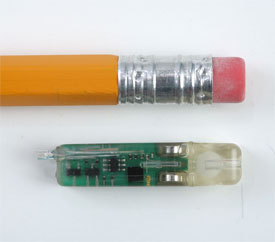
The Bravo pH Capsule – slightly larger than the top of a number two pencil.
It is estimated that more than 60 million Americans regularly experience acid indigestion, burning, and fullness that signal gastroesophageal reflux disease, GERD. For many patients, the path to an accurate diagnosis and appropriate treatment is not a simple one. Multiple tests can be required to pinpoint the precise cause and treatment for these complex digestive disorders.
The Cooper Digestive Health Institute is the first center in South Jersey to offer two innovative systems to more rapidly and accurately diagnose GERD.
The BRAVO™ pH Monitoring System is an ambulatory device used for detection and diagnosis of GERD. Using a wireless capsule that is placed in the esophagus, the system transmits data to a small, external receiver for 48 hours, as the patient continues normal activities.
In addition, Cooper is also now performing pH – Impedance Monitoring, a highly specialized test that is used to determine the specific type of reflux that the patient is experiencing. This specific identification aids in developing an individualized care plan.
“These tests provide a tremendous amount of very specific information on the digestive tract,” says Joshua P. DeSipio, MD, Cooper Digestive Health Institute gastroenterologist. “And, in the case of the BRAVO™ system, the patient is able to continue activities of daily life.”
“These specialized tests require not only advanced technology, but also expertise in interpretation,” says Steven R. Peikin, MD, Director, Cooper Digestive Health Institute, and Head, Division of Gastroenterology and Liver Diseases. “At Cooper we have the technology and the highest level of clinical interpretation and care.”
The Cooper Digestive Health Institute is also the only regional center to offer specialized diagnostic testing for swallowing difficulties, known as achalasia. Cooper is now performing High Resolution Manometry to measure pressure within the gastrointestinal tract to identify the origin of complex swallowing disorders.
